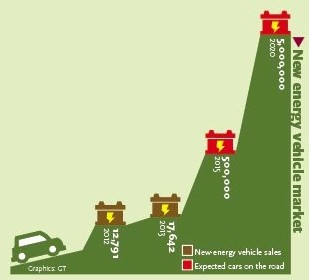

China will extend a program for subsidizing new energy vehicles beyond 2015 and the size of the subsidies for 2014 and 2015 will be gradually cut, the Ministry of Finance said over the weekend.
To maintain policy continuity and enhance support for new energy -vehicles, China will continue subsidies after the existing policy expires at the end of 2015 and the specific measures will be published separately, the Ministry of Finance said in a statement published on its website Saturday.
The subsidies will be cut 5 percent for 2014, instead of the previously announced 10 percent cut, and by 10 percent in 2015 instead of a 20 percent reduction, it said.
"The gradual cut of the subsidies is in line with the practice by other countries such as the US," Jia Xinguang, managing director of the China Automobile Dealers Association, told the Global Times Sunday.
"Subsidies to new energy vehicles will be bigger at the early stage when sales are small and production cost is high," Jia said, "but they cannot last forever."
In September, the ministry and three other government agencies planned to lower subsidies by 10 percent in 2014 and 20 percent in 2015.
They also said subsidies of up to 60,000 yuan ($9,894) would be -offered for purchase of fully electric-powered vehicles in 2013, 35,000 yuan would be granted for purchase of plug-in hybrid electric vehicles while buyers of fully electric-powered coaches could receive up to 500,000 yuan subsidies.
"The size of the cut was lowered and the decision reflects the compromises between different groups and a dilemma facing the country's new-energy vehicle industry," Zhong Shi, an independent auto industry analyst in Beijing, told the Global Times Sunday.
"The government cannot offer a large amount of subsidies to new-energy vehicles forever and also cannot withdraw subsidies all of a sudden as the new energy vehicle market still performs poorly," Zhong said.
China produced a total of 17,533 domestic new energy vehicles in 2013, an increase of 39.7 percent from the previous year.
China sold 17,642 new energy vehicles last year including domestic and imported vehicles, up 37.9 percent from 2012, China Association of Automobile Manufacturers January data showed.
But output and sales were still not sufficient to make the country meet its target to produce and sell 500,000 new energy vehicles by 2015 and 5 million by 2020.
To combat pollution, China launched a pilot program to promote new energy vehicles in 2009. But development of the sector still lags.
"Sales of newenergy vehicles were mainly for passenger vehicles last year and private car buyers are not keen to purchase new energy cars due to lack of support facilities such as charging stations and parking lots," Jia said.
Despite subsidies, local protectionism hinders development of the new energy vehicle sector as local governments only intend to support local car makers and confine development of non-local car makers in order to promote local GDP, Jia said.
Zhong said the technical standard in China is not mature enough to meet consumer expectations, "and car makers' lack of enthusiasm to invest in technology has also led to a poor market for new energy -vehicles."
In a separate statement Saturday, the ministry also published a list of 12 more cities and regions including Shenyang in Northeast China's Liaoning Province and Changchun in Northeast China's Jilin Province where new energy vehicles will be promoted.
In November, the first group of 28 pilot cities and urban areas including Beijing, Tianjin and Shanghai were chosen to promote new energy vehicles and qualified for government subsidies outlined in September 2013.
In late January, Premier Li Keqiang expressed his support for the use of electric vehicles on a visit to battery and electric vehicle company BYD, China National Radio reported.
"New energy vehicles, especially buses, can help improve urban pollution and noise problems in cities," Li said. "Everyone should use it. The government should play an exemplary role."
Copyright ©1999-2018
Chinanews.com. All rights reserved.
Reproduction in whole or in part without permission is prohibited.